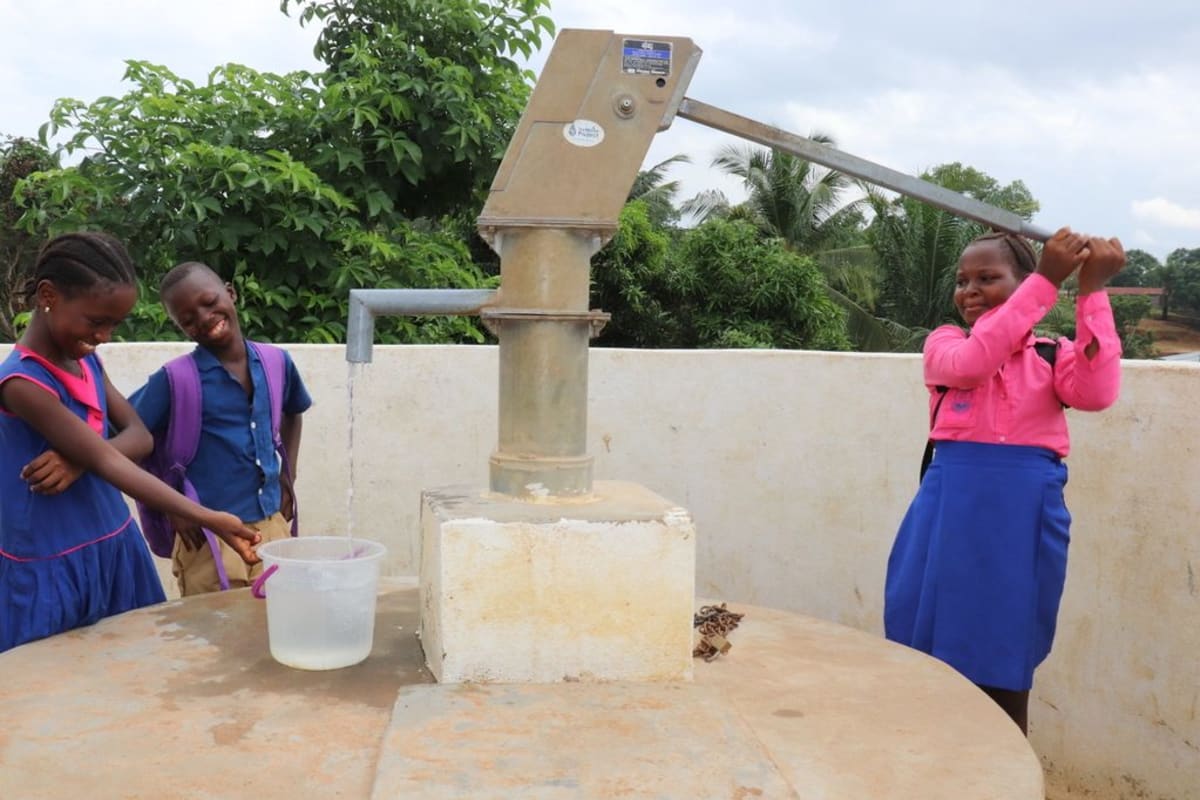Molokoh Community is right along the highway, which makes it very easy to reach because the highway was just paved. Buildings are in rows on either side of the road, some made of brick and others of cement. Most of these are homes with several family members living under one roof.
The mosque here is the central meeting place in this area. Headman Pa Sorie Kamara's parents were the original founders of this mosque. According to him, the mosque was around before he was born. That makes it almost a century old! About 175 people gather for prayers and teachings.
Water
Packaged water can be purchased in local shops, but the income level of most people does not make this a viable choice.
There is one working well here. There are two others that do not have water. The well with water gets extraordinarily crowded, and many community members can't make it through the line to fill their bucket. This forces them out to find water elsewhere, most often at the swamp. The swamp is far away, but there's always a chance to easily fill up a bucket, making it the primary water source for hundreds of people.
But at the peak of the dry season in March, even the working well goes dry. Even the early riser must resort to the dirty swamp water. The water in the swamp gets low too, and people have to dig holes to find water.
"Normally when I run out of pump water, I send my kids to fetch water from the swamp. But anytime I drink the swamp water, I experience frequent diarrhea. This makes me have a lot less energy," Mr. Pa Sorie Kamara said.
Sanitation
People living around here lack any respect for good hygiene. They are more concerned about earning a living than their health. They leave home very early in the morning and fail to clean their environment, which is the cause of some of their sicknesses.
There is a latrine for each gender at the mosque, but they're uncovered with flies coming and going. There are two handwashing pitchers available, but mosque leadership admits they rarely have water because of the overall shortage in this community.
"I have to confess that based on the small education that you have given me about hygiene just since we met, our current state is poor,"Sheik Umaru Sesay told us.
"Even our toilet in the mosque is not well sanitized because we do not have a handwashing facility in it, and the hole is not covered as we speak."
What we can do:
Training
There will be hygiene and sanitation training sessions offered to community members.
The hygiene and sanitation trainer decided it would be best to teach community members and mosque leadership how to build a tippy tap (a handwashing station built with a jerrycan, string, and sticks). They will use these tippy taps for handwashing demonstrations, and will also teach about other tools like dish racks and the importance of properly penning in animals. Pictures will be used to teach the community how to discern between healthy and unhealthy hygiene and sanitation practices.
These trainings will also strengthen a water user committee that will manage and maintain this well. They will enforce proper behavior and report to us whenever they need our help solving a serious problem, like a pump breakdown.
Well Rehabilitation
Out of the three hand-dug wells in Molokoh, the mosque is the best place to start restoring water. Since the entire community is Muslim, the mosque is already a daily meeting place for everyone.
This well is too shallow to outlast the dry months, will be converting it to a borehole at the bottom. Our drill team will be hand-drilling it much deeper! Once they’ve struck more than enough water, they’ll build a new well pad and install a stainless steel India MkII pump.
This clean water well will be open to the entire community, not just those attending prayers or worship at the mosque.
This project is a part of our shared program with Mariatu’s Hope. Our team is pleased to provide the reports for this project (edited for clarity) thanks to the hard work of our friends in Sierra Leone.

 Protected Dug Well
Protected Dug Well





























